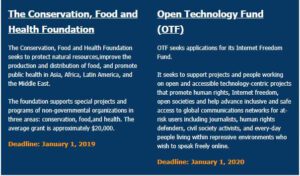


Committing to Realizing Positive Sustainable Change – Istanbul Principle XIII
Over the years, Civil Society Organisations (CSOs) have embarked on programs/projects that assist communities to become empowered and ultimately attain sustainable development. In the bid to implement various sustainable development-related projects, CSOs are often encouraged to work in collaboration with beneficiaries by involving them at the various stages of the project implementation through proper consultation, information-sharing, and partnerships.
As agents of development, CSOs serve as service delivery partners and therefore act as the link between the public and private sectors as well as stand in a position to more holistically identify and address developmental gaps that have been otherwise left behind by the other two sectors. Very importantly, they serve as a political watchdog and ensure equitable governance through monitoring and reporting progress at local levels.
The eighth Istanbul principle of development effectiveness – “CSOs are effective as development actors when they collaborate to realize sustainable outcomes and impacts of their development actions, focusing on results and conditions for lasting change for people, with special emphasis on poor and marginalized populations, ensuring an enduring legacy for present and future generations” implies that; for effectiveness, self-reliance, and sustainability on project impacts, CSOs should embark on capacity building projects to develop the knowledge and skill of the community to mobilize resources.
CSOs programs should be aimed at improving the economic well-being of communities by job creation and income generation which in the long run, will contribute to sustainable community development. Proper consultation and embarking on community-driven projects motivates local level participation in developmental projects to improve their quality of life and commit to realizing sustainable change.
Project sustainability should always be factored before embarking on project activities. The beneficiaries need to feel the impact of the project even after the project/donor fund is exhausted. Project effectiveness and maintenance can be actualized through proper stakeholder mobilization, collaboration and building larger and more active local constituencies for grass root support and ensuring no one is left behind.
